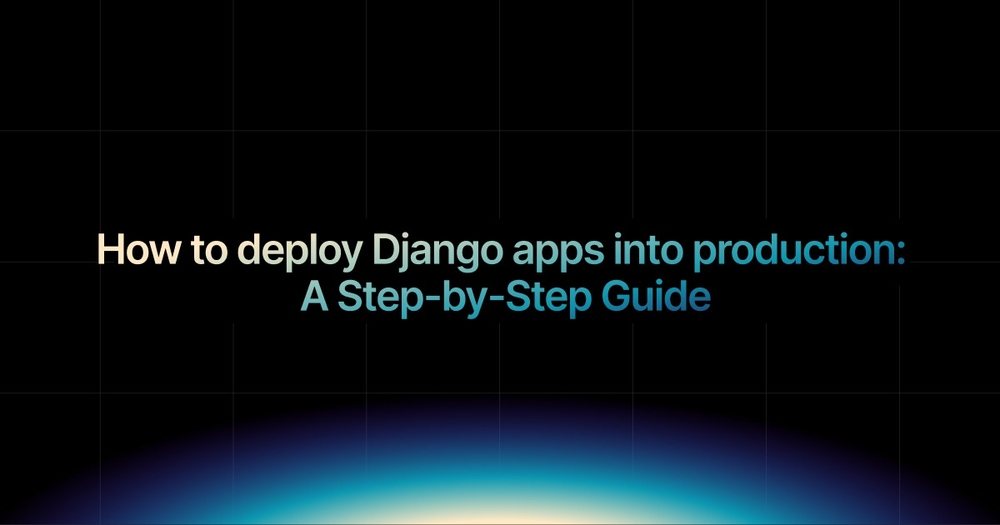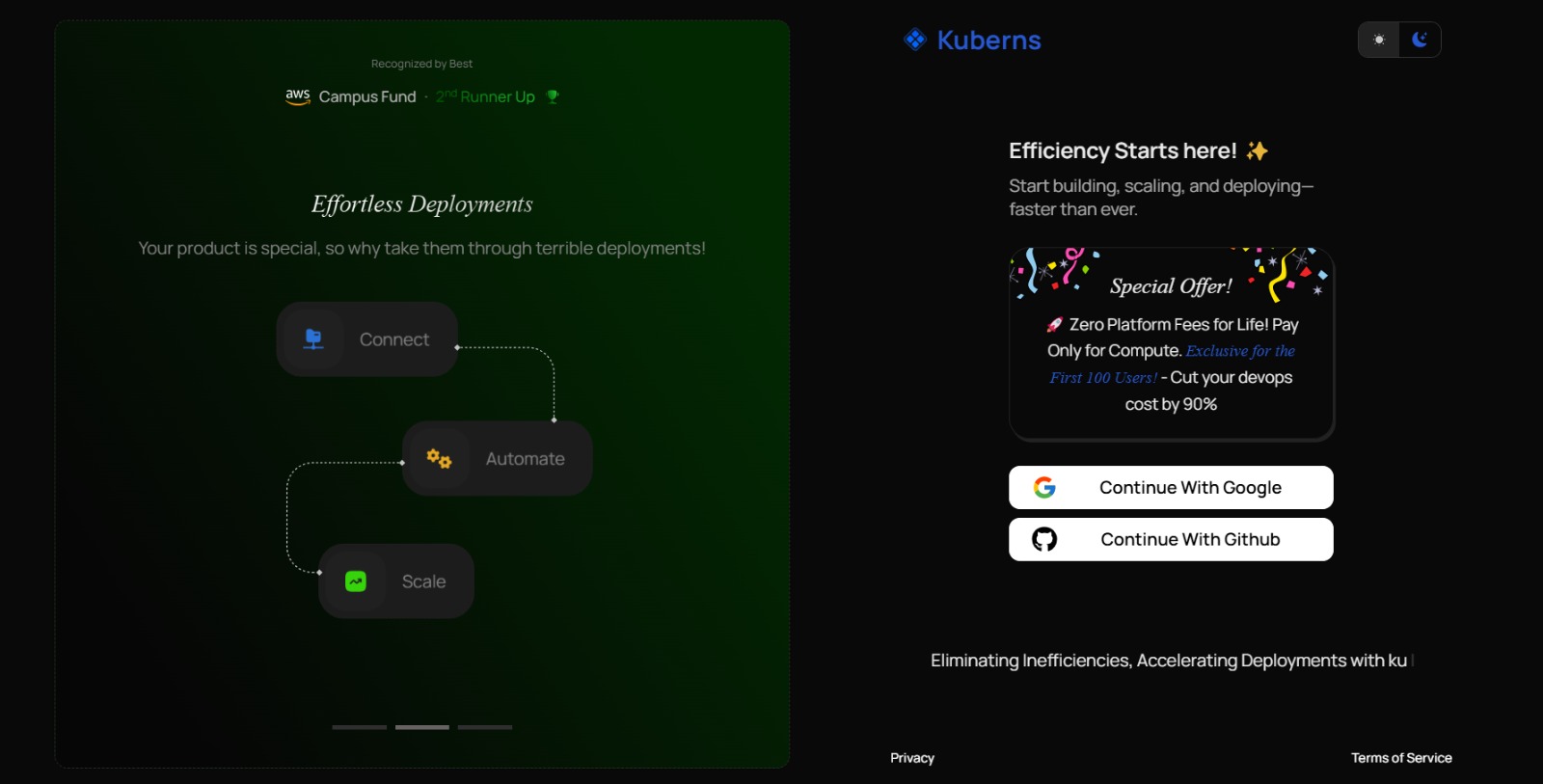Published
- 4 min read
How to deploy Django Apps into production in 10 mins?

Django deployments are often made to look harder than they really are, with complex setup instructions, unfamiliar tools, and too many manual steps.
The truth is, it doesn’t have to be this way.
This guide from Kuberns is built for simplicity.
If you have a working Django app and a GitHub account, we’ll show you how to take your project live in just 10 minutes.
No over-complicated processes. No fluff. Just the fastest and easiest way to deploy Django apps in 2025.
What you’ll get out of this guide?
By the end of this guide, you’ll:
- Have your Django app live on the internet.
- Learn a simple process you can repeat easily.
- Know how to skip complicated tools using Kuberns.
Bonus: You’ll also discover a smart way to reduce AWS cloud cost by 40%
Prerequisites before deployment
Before you begin, make sure you have the following:
- Python 3 installed
- A Django project that runs locally
- A GitHub account
- (Optional) Docker installed
- Kuberns account
Need help setting this up? Check the Kuberns docs for a full setup guide.
Simple steps to deploy your Django app in just 10 minutes
Prepare Your Django App
Start by making sure your Django project is ready for deployment:
- Set DEBUG = False in your settings.py
- Run:
 This ensures your app is secure and stable for production.
This ensures your app is secure and stable for production.
Push Your Code to GitHub
If your code isn’t already on GitHub:
 Kuberns connects directly to your GitHub repo for fast deployments.
Kuberns connects directly to your GitHub repo for fast deployments.
Connect Your Repo on Kuberns
 Go to Kuberns and log into the dashboard.
Go to Kuberns and log into the dashboard.
- Click “Connect GitHub Repository”
- Select the Django repo you pushed earlier
- Kuberns automatically detects your framework and sets up your environment
Deploy your Django app now → Start with Kuberns
Set Up Environment Variables
 From the Kuberns dashboard:
From the Kuberns dashboard:
- Add DJANGO_SECRET_KEY
- Set DEBUG=False
- Set ALLOWED_HOSTS=your-kuberns-app-url
- Add database variables if needed
Kuberns keeps these settings secure and editable without code changes.
Click Deploy
Once everything is ready, click “Deploy.”
Kuberns will:
- Build your app automatically
- Manage static files and database setup
- Make it live in minutes
You’ll see real-time build logs and get notified when your app is live.
For advanced setup, check out the full Django deployment docs
Watch this quick video to see the entire Django deployment in action:
Challenges Django developers face and how kuberns helps?
Too many steps and tools to learn
Many developers get stuck juggling multiple tools like configuring web servers, setting up databases, and managing secrets. It takes time to learn, test, and debug all of these.
Kuberns takes care of these steps behind the scenes. It auto-detects your Django app, sets up environments, and manages your deployment without needing you to write extra scripts or configurations.
Deployment errors and broken environments
You finally get your app live, but something breaks in production. Logs are unclear, errors are vague, and debugging feels like guesswork.
But with Kuberns dashboard, you get real-time build logs and one-click redeploys, you always know what’s happening. If something fails, you get a clean error log and can roll back or fix it quickly.
Manual updates and no version tracking
Changing even one environment variable means SSH-ing into a server or editing files directly. There’s no way to track what changed or why.
With Kuberns, you can update environment variables securely from the dashboard without touching the codebase. Every deploy is tracked, so you know what changed and when.
Scaling is unclear
Most beginner deployments work… until your app grows. Suddenly, you need to think about performance, uptime, and cost.
Kuberns optimises your app behind the scenes. Whether it’s scaling your app across containers or optimising how your app runs to reduce costs, it’s all handled for you.
Hosting and infrastructure setup are confusing
Where should you host? What’s the best way to configure databases, static files, and app servers?
You don’t need to make those choices. Kuberns provisions the infrastructure, sets up databases, and makes sure your app is running on secure and optimised AWS resources.
Spend less time fixing deploys and Save money on cloud cost. Try Kuberns today
FAQs by developers
Q: Do I need Docker to deploy with Kuberns?
A: No, it’s optional. Kuberns handles the setup for you.
Q: Can I use a custom domain?
A: Yes. Kuberns supports your domain and gives you HTTPS.
Q: What databases can I use?
A: PostgreSQL and MySQL are supported. You can connect others, too.
Q: Can I use this for a real production app?
A: Yes. Kuberns is built to support real, live apps.
Q: How much does it cost?
A: You only pay for what you use. Kuberns helps you save up to 40% on cloud costs.
Deploying Django doesn’t have to be a long and frustrating process. With Kuberns, you can go from local development to live production in just 10 minutes
Deploy your Django app the easy way → Get started with Kuberns for free